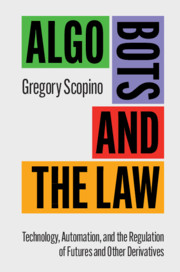Book contents
- Reviews
- Algo Bots and the Law
- Algo Bots and the Law
- Copyright page
- Contents
- Preface
- Introduction
- 1 Key Concepts: Algorithms, Artificial Intelligence, and More
- 2 Economic Definitions of Common Derivatives
- 3 Legal and Regulatory Definitions of Derivatives and Other Financial Instruments
- 4 FinTech: From Science Fiction to Non-Fiction
- 5 The Regulatory Framework for the US Derivatives Markets
- 6 Gateways to the Futures Markets – FCMs
- 7 Collective Investment Vehicles and Investment Advisors
- 8 Salespeople, Supervisors, Owners, and Enumerated Others
- 9 Trading Floor Denizens
- 10 Regulating Digital Intermediaries
- 11 States of Mind: From Zero to Specific Intent
- 12 Market Manipulation: Then and Now
- 13 Fraud Is Many Things (for Humans and Robots)
- 14 Disruptive Trading Practices
- 15 Spoofing: Market Disruption Made Easy by Technology
- 16 Adequately Supervising the Overseers of Algo Bots
- 17 Flash Events
- 18 Algo Bots All over the World
- 19 Conclusion
- Index
4 - FinTech: From Science Fiction to Non-Fiction
Published online by Cambridge University Press: 02 October 2020
- Reviews
- Algo Bots and the Law
- Algo Bots and the Law
- Copyright page
- Contents
- Preface
- Introduction
- 1 Key Concepts: Algorithms, Artificial Intelligence, and More
- 2 Economic Definitions of Common Derivatives
- 3 Legal and Regulatory Definitions of Derivatives and Other Financial Instruments
- 4 FinTech: From Science Fiction to Non-Fiction
- 5 The Regulatory Framework for the US Derivatives Markets
- 6 Gateways to the Futures Markets – FCMs
- 7 Collective Investment Vehicles and Investment Advisors
- 8 Salespeople, Supervisors, Owners, and Enumerated Others
- 9 Trading Floor Denizens
- 10 Regulating Digital Intermediaries
- 11 States of Mind: From Zero to Specific Intent
- 12 Market Manipulation: Then and Now
- 13 Fraud Is Many Things (for Humans and Robots)
- 14 Disruptive Trading Practices
- 15 Spoofing: Market Disruption Made Easy by Technology
- 16 Adequately Supervising the Overseers of Algo Bots
- 17 Flash Events
- 18 Algo Bots All over the World
- 19 Conclusion
- Index
Summary
With each passing day, the futures markets continue their transition to largely electronic ecosystems for algorithmic, software robots. The automation of these markets is part of a broader trend in financial services whereby the use of computerized systems is expanding into areas of financial firm operations that had not previously been thought amenable to algorithmic control. That’s not to say that humans are no longer playing important roles in financial services in the markets for futures and other derivatives, but the scope of human roles is diminishing as algo bots become capable of performing more and more tasks that were once the sole responsibility of human traders, derivatives salespeople, risk analysts, and more. As mentioned in the Introduction, the computerization and automation of financial markets is generally associated with the rise of “financial technology,” commonly referred to as “FinTech” or “Fintech.”
- Type
- Chapter
- Information
- Algo Bots and the LawTechnology, Automation, and the Regulation of Futures and Other Derivatives, pp. 175 - 198Publisher: Cambridge University PressPrint publication year: 2020



